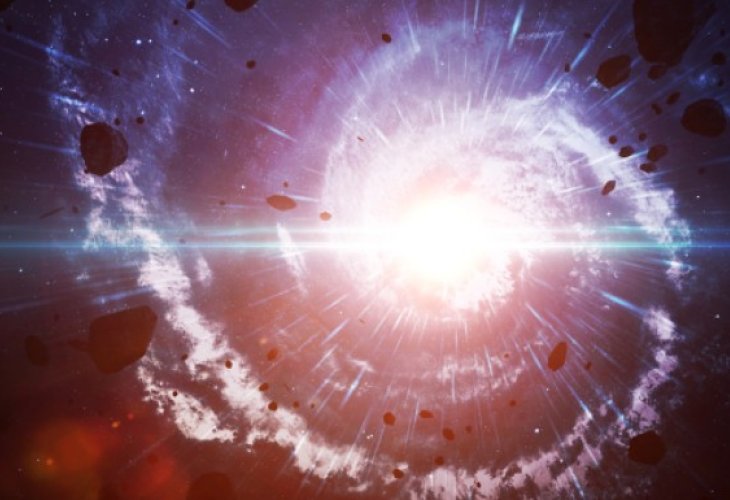What is the "Big Bang Theory," and How Does Judaism View It? 5 Points to Ponder
How does our speech mechanism work? Who is the automatic guardian of our lives? What is the strongest thread in the world, and what is the "ticking bomb" analogy?
 (Photo: shutterstock)
(Photo: shutterstock)Say Something
If I ask how you speak—meaning, what actions you take to produce sounds and syllables that form words—I assume none of you could explain how you speak and produce sounds. Despite the importance of speech for us, we have no idea how we manage to produce sounds. It's a bit surprising, isn't it?
Let's do a short exercise: while speaking, try to feel what's happening within you. Note the perfect synchronization between the body parts involved in speech:
You will likely feel that during speech, the mouth opens and closes, and various parts such as the lips, teeth, tongue, palate, throat, and sometimes even the nose participate. In the creation of each sound, certain speech organs operate, but in all sounds, without exception, a very important organ participates, which isn't found in the mouth or nose: the lungs—the airflow coming from the lungs is pushed upwards and exhaled through the mouth during speech.
 (Photo: shutterstock)
(Photo: shutterstock)Try to make a sound without expelling air from your lungs. Did you succeed?
The speech process starts in the brain, where words are formed and translated into neural signals that activate a complex of muscles producing sound. Cooperation between several body parts and perfect synchronization among them result in sound production.
Note that these are complex actions that we perform automatically, and this process is ingrained in us without difficulty or effort on our part. A small "glitch" could lead to language difficulties, such as stuttering or, G-d forbid, muteness...
Have we ever thought about what the speech process involves? Who designed this process? Have we ever appreciated and thanked Hashem for our ability to speak and communicate with our surroundings, an ability not to be taken for granted?
The Strongest Thread in the World
There are many kinds of strong threads, like steel cables, ropes, fishing lines, and more. Strong threads are made of various materials like nylon, steel, plastic, Kevlar (a synthetic fiber), and more. So, what do you think is the strongest thread in the world? Some of you may find the question puzzling, but the answer is even more surprising: The strongest thread in nature relative to its thickness is the spider web! To this day, advanced science has not managed to find threads as thin as spider webs that can bear a similar load.
Spider webs are the strongest creations of living creatures. They are made from silk, which the spider produces in special glands in its abdomen. In addition to their flexibility, spider webs are notable for their extreme strength: while the average web is about a tenth of the thickness of a human hair, its strength is enormous, several times that of steel thread of the same diameter!
Wait, if the thread is so strong, then how can we tear it easily? The explanation is simple. The spider web is the strongest thread relative to its thickness! That is, the spider web is very thin, so we can tear it easily—but if we combine many spider webs into a rope, it would be very strong!
 (Photo: shutterstock)
(Photo: shutterstock)Spiders use webs not only to catch prey, but also to move from place to place, create egg sacs, seal openings, and more. A spider can glide from the ceiling to the floor on a thread it produces at that moment, during the glide!
Wait, how come spiders themselves don't stick to their webs? How don't spiders get tangled in their own webs?
The spider doesn't get tangled in the webs it spins because its legs are greasy. The greasiness ensures that their legs glide over the strands in the web, so they are never trapped.
Just seeing their webs is enough to marvel at the wisdom with which the Creator endowed them, to spin webs to capture small flying insects. And I ask, who taught them to spin? Is there "intelligence" in the spider's tiny brain to sustain its life in such sophisticated ways, or does this clearly indicate the Creator who provided it with all it needs?
Yes, friends, even from the smallest creature we can learn the most important things—seeing the power and greatness of the Creator of the world!
Theory of the Big Bang
The creation of the world is a subject that researchers still try to decipher today. So, what is the Big Bang, and how does Judaism relate to this idea?
In the creation narrative, on the first day, the Torah says "And Hashem said, Let there be light; and there was light" (Genesis 1:3). What is this light, where did it come from? If you say it's sunlight, that's impossible, because a few verses later it is said that on the fourth day, Hashem created the great lights: the sun and the moon. So, what is the light created on the first day?
In the Zohar, Rabbi Shimon bar Yochai says this light is actually what scientists discovered in the last century, the theory that received the name "the Big Bang." According to the Big Bang Theory, the universe appeared when there was a tremendous explosion, a great burst of energy light, which underwent various processes until the materialization of all matter. This is how all the galaxies and stars were created.
Rabbi Shimon bar Yochai says: When Hashem wanted to create the world, He emitted a hidden light that burst out. From that light, all the lights that were revealed emerged... The universe was created as a result of a chain of more and less spiritual universes until the materialization of matter. The Zohar concludes: The master (a term for the Creator) made a non-illuminating light and made the lower world, the physical world we witness today.
We can see that the Big Bang Theory not only does not contradict Judaism, but it matches what many commentators wrote, that Hashem created the world with a primordial, massive light and created the world and stars from primary matter...
Where did the light come from? When scientists ask, where did the eruption of that tremendous energy come from? That great burst of light, where did it come from? They have no answer! Prof. Hawking notes: "Creation lies outside the known boundaries of physics." For us, in the Torah, it is written: "In the beginning, Hashem created the heavens and the earth" (Genesis 1:1), and here all the answers lie...
Protective Mechanisms
Our body is an invaluable product. The Creator of the world watches over us vigilantly, and He is the one who created in our bodies various systems that do not allow a person to consciously stop the activity of any vital body system, thereby harming themselves.
For example, a depressed person might decide they no longer wish to breathe, thereby ending their life. But the Creator of the world does not allow this! That person can hold their breath only for a few minutes.
What is the process that occurs in our body?
Breathing does two processes: it introduces oxygen and expels carbon dioxide. When we stop breathing, whether willingly or not, there will be an increase in carbon dioxide levels. When carbon dioxide accumulates, receptors in the brain are activated, and then the brain "forces" the person to breathe. That is to say, the brain ensures that the person does not die, and the person cannot resist this. This is an internal mechanism created by the Creator to protect life.
 (Photo: shutterstock)
(Photo: shutterstock)Similarly, there is subconscious control of sleep and wakefulness. A person cannot avoid sleep for an indefinite period. We have an internal mechanism that regulates the system beyond our will, a necessary requirement for human existence.
There is no doubt, man was created with wisdom and such wonderful insight, with remarkably coordinated and integrated systems, each organ in its suitable place. Every substance in precise dosage, every action at the appropriate timing...
Ticking Bomb
If I told you there is a one percent chance, in the building you live, there is the most destructive bomb which will explode at some future time, would any of you take the risk and not try to locate and remove the bomb as quickly as possible?
I'm sure all of you would immediately and energetically look for the bomb, even if the risk was the smallest percentage.
What is the analogy?
This is an appeal to all my brothers who do not observe Torah and commandments, with a simple argument: If there is the smallest one percent chance that I'm right and indeed there is a Creator of the amazing world we live in, who provides us with life, livelihood, health, and more, who instructed us how to behave according to a manufacturer's instruction manual, and accordingly grants reward and punishment— isn't that important and serious enough for you to take responsibility for your lives?
I'm not expecting an atheist to rush to the nearest store and buy tefillin, but I would expect an intelligent person to research, deepen, and clarify as far as they can, whatever their conclusions may be. It concerns their life, a "ticking bomb"! It concerns a matter of enormous significance to every one of us, in this world and the world to come.

